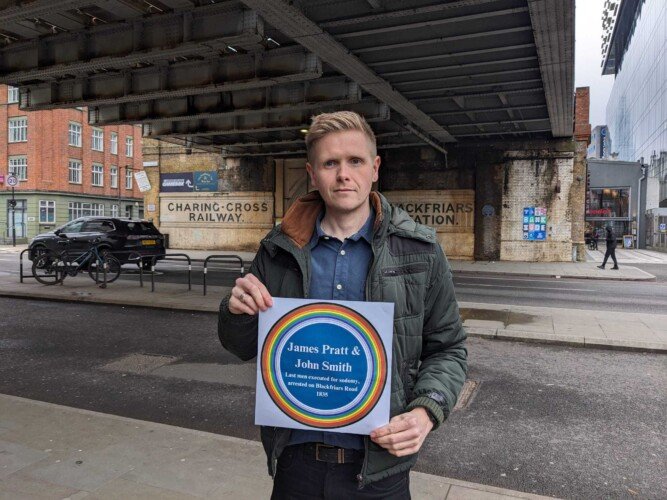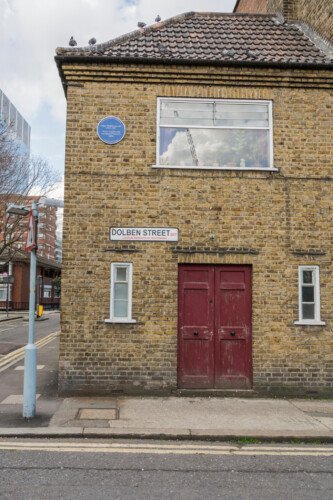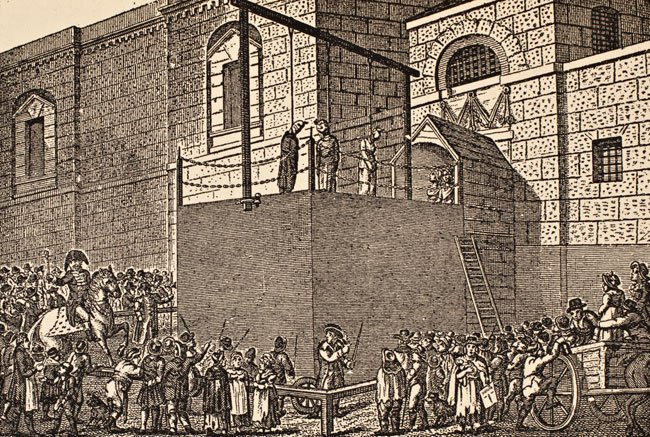1835: The hanging of James Pratt and John Smith
On November 27, 1835, at around 8pm a crowd gathered outside Newgate Prison.
They hissed and groaned as two men were carried on to the scaffolding, too weak to stand by themselves.
As the clock struck 8pm, the bolt was drawn, and the two men killed.
The hanging of James Pratt, 30, and John Smith, 40, became the last executions for homosexual acts in English history.
Three months earlier, on August 31, Mr Pratt said goodbye to his wife and two young daughters at their home in Deptford, Greenwich.
He met Mr Smith at 45 George Street – now Dolben Street – a run-down lodging house off Blackfriars Road in Southwark.
They had been invited to the property by William Bonill, a 68-year-old labourer described at the time as “with silver hair and a large chin”.
Mr Bonill’s landlord, George Berkshire, had grown suspicious of his tenant, who had been bringing men back to his flat on a regular basis.

Shortly after the three men arrived, Mr Berkshire went into the loft of a neighbouring stable where he could remove a tile to have a clear view into Mr Bonill’s window.
He told his wife Jane that he saw Mr Pratt sitting on Mr Bonill’s knees and then on Mr Smith’s.
Outraged, Mrs Berkshire crept upstairs to look for herself. Peeping through the keyhole of the flat, she witnessed the men engaging in sexual acts.
The landlords reported all three men to the authorities.
Mr Pratt and Mr Smith were convicted at the last September Sessions, at the Old Bailey. They were both sentenced to be hanged.
Mr Bonnell was convicted of aiding in and procuring the commission of the crime and sentenced to 14 years’ transportation.
During their sentencing, they were ordered to appear separately to prevent the “contamination” of other convicts.
According to the Hereford Journal, the pair “appeared considerably affected” and “left the dock in tears”.
They were also kept separate from other prisoners while awaiting execution at Newgate Prison.
Two days before the hanging, on November 25, 1835, Mr Smith sent a letter to a friend, William, from his cell.
He wrote: “The grave will soon close over me, and my name entirely forgotten”, before signing, “Your Lost Friend, John Smith”.

Mr Smith and Mr Pratt were hanged before a large crowd of spectators outside of Newgate Prison.
According to reports by the Hereford Journal, the two men appeared “in a very weak state” and were “carried from their cell rooms” as Mr Pratt’s “groans resounded through the prison”.
The report stated: “The moment the culprits were perceived they were received with groans and hisses, which lasted during the whole of the time the hangman was making the necessary preparations.
“These having been performed, the bolt was drawn, and after a very short struggle the culprits ceased to exist.”
As for Mr Bonnell, his name is included in a letter from November 6, 1835, authorising the transport of 290 male convicts aboard the ship Asia, which set sail on February 21, 1836, bound for Van Diemen’s Land, Australia – the colonial name for Tasmania.
Soon after his arrival in the penal colony, on September 18, 1837, he was charged with misconduct for pulling down a portion of the roof from a carpenters shop without leave, and given 24 hours’ solitary confinement.
He died at New Norfolk Hospital – a hospital built especially to house the mentally ill – on April 29, 1841.

The death sentence for sodomy was not officially abolished in 1835.
For many years after men continued to be sentenced to death for the act, but the sentence was always immediately changed to transportation for life.
In 1861, after executions had not been carried out for many years, the felony was abolished.
The case of Mr Pratt and Mr Smith acquired its status as “the last hanging for sodomy” only in retrospect, and did not receive special attention at the time.
The pair were later pardoned by the Alan Turing Law in January 2017, which gave posthumous pardons to those convicted of homosexuality offences.
The street in which Mr Bonill lodged was renamed in 1911 as Dolben Street. Also home to writer and philosopher Mary Wollstonecraft from 1788–1791, a Blue Plaque marks the location.
To mark LGBTQ+ History Month, the Southwark Liberal Democrats have ramped up their campaign for a Rainbow Plaque and memorial to be installed in Blackfriars Road to commemorate Mr Pratt and Mr Smith.
Pictured top: The hanging of James Pratt, 30, and John Smith, 40, outside Newgate Prison (Picture: Wikimedia Commons)
